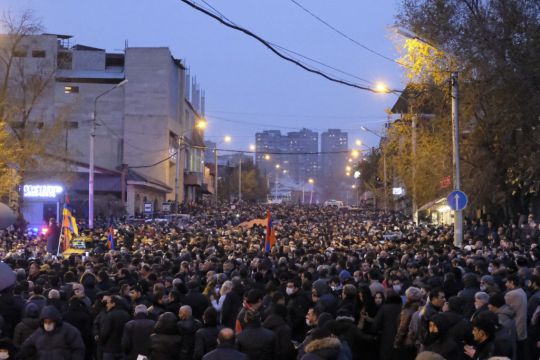Tens of thousands of opposition supporters have marched across the Armenian capital to push for the resignation of the ex-Soviet nation’s prime minister over his handling of the conflict with Azerbaijan over Nagorno-Karabakh.
In six weeks of fierce fighting that ended with a Russia-brokered peace deal on November 10, the Azerbaijani army reclaimed lands that Armenian forces have held for more than a quarter of a century.
Armenia’s opposition parties warned the prime minister Nikol Pashinyan there would be civil disobedience across the country if he does not resign by noon on Tuesday.

Mr Pashinyan has refused to step down, defending the peace agreement as a painful but necessary move that prevented Azerbaijan from overrunning the entire Nagorno-Karabakh region.
More than 20,000 protesters rallied in Yerevan on Saturday, before marching to the prime minister’s official residence.
Artur Vanetsyan, the leader of the opposition party Homeland and the former head of the National Security Service, said at the protest rally: “The seat of the prime minister of Armenia is currently being occupied by a political corpse.”
Several priests of the Armenian Apostolic Church joined the protest, denouncing Mr Pashinyan for allowing Azerbaijan to take over some holy sites.
Nagorno-Karabakh lies within Azerbaijan, but has been under the control of ethnic Armenian forces backed by Armenia since a separatist war there ended in 1994.

That conflict left not only Nagorno-Karabakh itself but large chunks of surrounding lands in Armenian hands.
In 44 days of fighting that began on September 27, Azerbaijan troops routed the Armenian forces and wedged deep into Nagorno-Karabakh, forcing Armenia to accept the November 10 peace deal that saw the return to Azerbaijan of a significant part of the separatist region.
It also obliged Armenia to hand over all of the areas it held outside Nagorno-Karabakh.
Azerbaijan completed reclaiming those territories on Tuesday when it took over the Lachin region, located between the Nagorno-Karabakh and Armenia.
Azerbaijan celebrated the end of fighting as a national triumph, and the country’s president Ilham Aliyev established a new November 8 national holiday called Victory Day to commemorate the event.
Armenian opposition leaders hold Mr Pashinyan responsible for failing to negotiate an earlier end to the hostilities at terms that could have been more beneficial for Armenia.

They have emphasised, however, that the opposition was not pushing for the annulment of the peace deal.
Veteran politician Vazgen Manukyan, whom 17 opposition parties have nominated as their candidate for prime minister, said at Saturday’s rally that his transition government would seek to renegotiate some vague aspects of the November 10 peace deal.
Mr Manukyan, 71, served as prime minister in 1990-91, when Armenia was part of the Soviet Union and later served as defence minister during the separatist war.
On Thursday, Azerbaijan released information on its military casualties from the latest fighting. The defence ministry said 2,783 troops were killed and more than 100 are still missing.
The government said 94 of its civilians also were killed and more than 400 were wounded.
Armenia’s health ministry said on Wednesday that at least 2,718 Armenian servicemen were killed in the fighting. At least 55 Armenian civilians also were killed.
Russia has deployed nearly 2,000 peacekeepers for at least five years to monitor the peace deal and to facilitate the return of refugees.
The Russian troops will also ensure safe transit between Nagorno-Karabakh and Armenia across the Lachin region.







